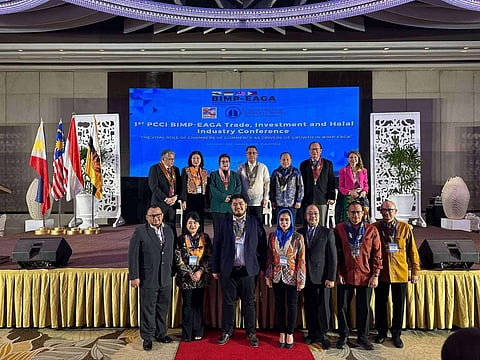
- NEWS
- the EDIT
- COMMENTARY
- BUSINESS
- LIFE
- SHOW
- ACTION
- GLOBAL GOALS
- SNAPS
- DYARYO TIRADA
- MORE

DAVAO CITY – Various Halal industry stakeholders from the Brunei Darussalam–Indonesia–Malaysia–Philippines East ASEAN Growth Area (BIMP-EAGA) gathered on Tuesday for the first-ever BIMP-EAGA Trade, Investment, and Halal Industry Conference in Manila.
The historic event brought together prominent officials from BIMP-EAGA, including Brunei Darussalam Ambassador Megawati Manan, Malaysian Ambassador Dato Abdul Malik Melvin Castelino, Indonesian Ambassador Agus Widjojo, United States Agency for International Development (USAID) Assistant Mission Director Michelle Chen, Philippine Chamber of Commerce and Industry (PCCI) Chair George Barcelon, PCCI President Consul Enunina Mangio, PCCI Vice President for Mindanao Elena Haw, PCCI BIMP-EAGA Committee Chair Joji Ilagan-Bian, and Acting Secretary of the Department of Trade and Industry (DTI) Cristina Aldeguer-Roque.
In a statement, Mindanao Development Authority (MinDA) Secretary Leo Tereso Magno praised the PCCI’s efforts to foster development by engaging with the BIMP-EAGA market.
He highlighted the critical role of the private sector in driving economic growth, noting, "No government endeavor can achieve full success without the participation and assistance of private entities like the PCCI."
Magno emphasized the vast potential of the Philippines working in collaboration with BIMP-EAGA member nations and the private sector to tap into the burgeoning trillion-dollar halal industry.
"With the right partnerships, we can position the Philippines as a key player in the global halal market," he stated.
Magno assured the audience that MinDA is committed to providing comprehensive government support to private sector entities engaged in the halal industry.
“We understand that the private sector is the engine of growth in BIMP-EAGA. Increasing private sector engagement enhances the prospects of establishing trade linkages and joint ventures, which can lead to more income and livelihood opportunities for local communities," he added.
He also highlighted President Ferdinand Marcos Jr.’s strong interest in developing the halal industry, a priority articulated during his state visit to Brunei Darussalam.
The global halal market is valued at approximately USD 2 trillion, catering to a population of around 1.6 billion Muslims worldwide. In the Philippines, the halal industry has expanded across various sectors, including food, cosmetics, pharmaceuticals, and tourism.
Government initiatives like the Philippine Halal Export Development and Promotion Program are vital in positioning the country as a significant player in this sector. The Philippine Halal Certification Scheme, managed by the DTI and the National Commission on Muslim Filipinos (NCMF), ensures the integrity of halal products, which is crucial for accessing international markets, particularly in Southeast Asia and the Middle East.
